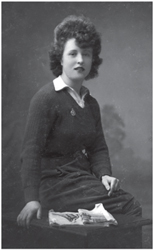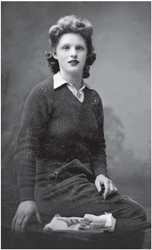Essex Land Girls (17 page)
Authors: Dee Gordon

Many girls were ploughing late into the night, so even the blackout regulations proved a hazard. The directive ‘Plough now! By day and night’ was all very well, but farmers faced prosecution for using headlights on night-driven tractors – until an order was introduced allowing dimmed headlights. The girls then had to manage with a lantern hidden in a ditch or a low-powered lamp tied to the plough itself.
The diaries of
Dorothy Jennings
give some indication of the everyday nature of wartime activity, with many references to aircraft overhead, troop convoys, the sound of guns and air-raid warnings:
18.10.43 | A plane came down just across the road to us. The flare lit our room up. We were all scared. |
26.10.43 | Some soldiers had to dig a shell up out of our field. |
10.2.44 | Found two unexploded incendiary bombs but had to go on ditching. |
21.2.44 | The fields at Clay Tye were covered with incendiary bombs. Canadian convoy at barracks – never seen such big tanks. |
3.6.44 | Last night some bombs dropped very near to the hostel [at Warley]. Our bunks rocked – saw a big Canadian convoy. Planted leeks. |
7.6.44 | There are a new lot of soldiers, The Queens, in the camp at the bottom of road. Stopped by police for riding two on a bike with no lights and no i.d. but got away with it. Took beds into kitchen to be safer. |
27.7.44 | Bomb dropped opposite the waterworks not far away. |
11.8.44 | Saw a doodlebug today. |
19.9.44 | Bad raid 4.30 this morning. Doodlebugs came down close. |
11.10.44 | Rocket nr S. Ockendon 5.15 this morning. It shook us. |
While many Land Girls worked with one, or a dozen, other members of the WLA, others worked alongside youths and the elderly, alongside female agricultural workers and even the partially disabled – i.e. all those not called up. Perhaps more memorably, many girls worked alongside prisoners of war and conscientious objectors. However,
Florence Rawlings
had a different story to tell – of working with ‘a funny guy who was an ex-convict from Springfield Gaol called George, [who had been] imprisoned for breaking and entering’. When Florence stumbled one day with a curry comb in her hand, she tore George’s nose with it, badly enough for it to need stitches, but ‘he didn’t tell the farmer’.
Interestingly,
Jean Watsham
, who worked in the Mersea area, thought that many Land Girls were not that competent and ‘too preoccupied with their appearance and nails’. She also provides a detailed account of working with prisoners of war.
I worked first of all with Italian prisoners of war who arrived in a lorry with an armed guard, probably from Colchester. One mended my bike on more than one occasion, and others showed us how to make baskets out of hedge-wood – the bottom of the basket was the easiest. German POWs came later, on a different farm [same area] and I actually preferred them; the Italians didn’t seem that trustworthy.
One fourteen-year-old German claimed to have been a POW for two years! He spat on the ground every time I passed during the potato picking and was a real Nazi. But one day I bought three combs during my lunch hour, having seen the state of their combs, and I gave them to the Prisoners who were delighted … I also shared my cigarettes with them. After that, this boy put his hand up when I was passing and when I stopped, he gave me a bunch of poppies and wild flowers, and continued to give me a similar bunch every day. It seems he had been told off by his bosses.

Eileen from Stratford, aged 18 in 1944, who lodged with Cath and Gordon Mussett, Mersea, in the Second World War. (Courtesy of the David Mussett collection, Mersea Museum)

Minnie Humphries from Stratford, in 1944. Another lodger with the Mussetts in Mersea in the Second World War. (Courtesy of the David Mussett collection, Mersea Museum)
I used to feel sorry for the Prisoners, especially as I was allowed to smoke when using the tractor. I worked with them potato picking and they helped me top up my pea picking [which was paid on a piece work basis], again in exchange for cigarettes. One submarine Captain used to sit on the mudguard of my tractor for hours and told me, in poor English, that he owned a garage in Berlin and said he would show me around.
The horse-drawn wagons were loaded with the help of another German who spoke good English, and two others helped with pitching the sheaves. They came in to work five days a week if there was work for them, except in bad weather, using furniture lorries or whatever was available. They all tried to teach me German, including swear words – it was a good laugh. One day, when they were having lunch in the cart-shed, I could understand much of what they were saying, having picked up a surprising amount of the language. The farmer, Mr Kerr, thought I might not like working with Germans but I enjoyed it. They even taught me to drive a Chevrolet [belonging to the farmer?] in spite of the double de-clutch which was very difficult. During the sugar-beeting, the Germans boiled up the beets to make sugar – they were clever and keen to do something, unlike the Italians. They were very good at carving, and used tin as well as wood, and they made a doll’s house for my sister and all the furniture for its interior including a mirror for the dressing table and table-cloths which were hand-stitched, all during their break time. They made pocket money by selling such things, as they earned only a few shillings per day.
While working at the Castle Hedingham estate,
Rita Hoy
was picked up each morning from her billet at High Garrett (near Braintree) by open lorry, which ‘stopped off at a prison camp nearby to pick up Italian prisoners of war’ who worked alongside her. She recalls them ‘laughing’ at the ‘big summer garden hat’ worn by ‘the lady of the castle’ (the camp was almost certainly High Garrett Camp 78, formerly RAF High Garrett, originally for Italian prisoners of war, later for Germans).
‘Lazy but very good cooks and made good rabbit stew,’ was how
Hilda Gentry
summed up the Italians she worked with in the Braintree area. As for the Germans, she ‘got on with them’ but thought them ‘mostly sullen’. Although
Vie Milbourne
was not in the Land Army, she worked with them (as a schoolgirl) and with ‘four German prisoners of war, all very nice teenagers’ in the Barling area. As a ganger, she taught them how to do the ditching. One of the lads (she doesn’t recall whether it was Heinz, Ernst, Bruno or Paul …) made her ‘some slippers out of string as a gift’ for her eighteenth birthday in 1945. A German prisoner at Harlow drew a picture on a piece of log which became one girl’s precious possession for some years and others were spoken of as ‘worryingly efficient’ because of the speed with which they gathered corn into stooks.
Gladys Pudney
, when at The Orchards in Writtle, remembered the workforce being enhanced:
… with four German POWs who came by lorry from a camp in the direction of Boynton Cross, possibly Skreens Park. The Sergeant, Heinrich, spoke some English. He was worried about his wife and little girl at home. They sent clothes out [to Germany]. Hubert was a tailor and there was Robert and Willie. They were good chaps who lived in bunks in accommodation near the gates. Their camp commander came to criticise Mr Pudney [the farmer] for giving the POWs extra bread and potatoes. Mr Pudney told him that there were no hungry animals on his farm so there would not be any hungry men.
There were also ‘six very nice, strong, wonderful workers, all Austrians and two of them farmers’, regarded as an asset by Diana Thake, working at Waltham Abbey.
Joyce Theobald
worked with Italian prisoners of war on the fields at Braxted Park, and they were used to add extra weight to the plough if the ground was hard and dry. She recalls them as being ‘very cheeky’ and that they used to pinch her bottom, so to get her own back, she would ‘rev up the tractor, go faster and give them a bumpy ride’.
One lasting memento of
Celia Waldman
’s work with prisoners of war at Great Wakering was the silver cigarette case made especially for her by one talented Italian, a treasured possession. She described the Italians as ‘friendly and flattering’ but the Germans, who came later, as ‘sullen’.
According to
Winifred Daines
, the German and Italian prisoners of war were memorable for their flirting, but even more so because they had much better facilities than the Land Girls. ‘They travelled in heated buses and at lunch time they had a canteen for a hot meal while we had sandwiches curled up in the heat.’ In a newspaper interview of 1989,
Audrey Clarke
appreciated the Italians in Harlow, especially their singing: ‘I remember one Italian called Mario. He had the loveliest voice.’ The singing Italians were one of the nice sounds that broke up a morning of potato planting, far more welcome than the sound of a doodlebug overhead.
The Italians were criticised by
Ellen Brown
, who thought they were ‘lazy’ with no attempts made to speak English. She preferred ‘the older Germans’ and found the younger ones ‘frightening’ when they came on to the farms – even though accompanied by guards – to ask for water. The German prisoners that
Vicky Phillips
worked with at Wallasea Island when on pest control duties were ‘gentlemen and hard workers’ compared to the Italians. Having retained some German from her school days, she could communicate with these prisoners (possibly from Tillingham), and she rather ‘admired them’. But not the Italians. ‘I worked with them at Harlow … and … all they thought about was trying to get the girls into the bushes – and they were very lazy.’
As for the conscientious objectors,
Margaret Penfold
and
Dorothy Jennings
both worked with them, Dorothy thinking them ‘quite nice’. However,
Elsie Haysman
‘objected to their opinions’ and ‘didn’t like working with them’ although they ‘worked hard’, when at Wallasea Island. She admits to ‘regularly giving them Ex-Lax instead of chocolate’ – so she
really
didn’t like them! (Interestingly, in some rural areas like Clavering, there was more use made of conscientious objectors and Italian prisoners of war than of the WLA.)

The WLA badges belonging to Dorothy Jennings. (Courtesy of Anne O’Callaghan)
An anonymous account of experiences as a Land Girl can be seen at Braintree District Museum, credited simply to ‘Joyce’. She writes of:
… sitting on the grass verge waiting for our lorry that would take us back to the hostel at Coggeshall, when the German POW lorry passed by. We felt sorry for them and until now we had just waved. Today, however, I
knew
they were going to throw a note and just as their lorry was halfway past, I was on my feet looking for it. The note was tied to a piece of wood so that it did not blow away. It was strictly forbidden for any sort of communication between them and us so they were taking a chance really. We did not reply but we carried on waving. I kept the note as you can see. Much later some of the POWs were in the same queue as us in Crittalls [the metal window factory whose canteen they were allowed to use] and we nodded to them but were quickly moved on by their guards.
